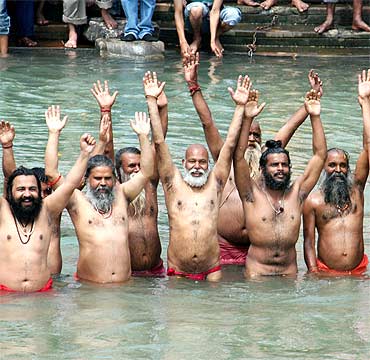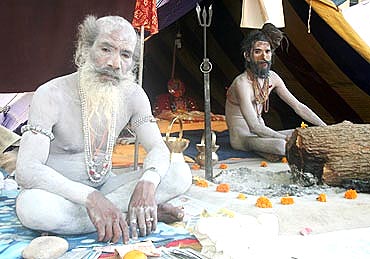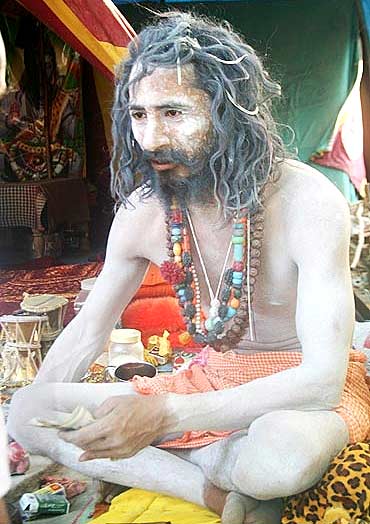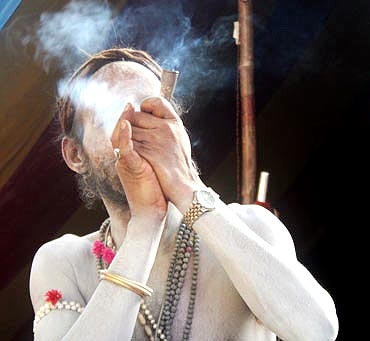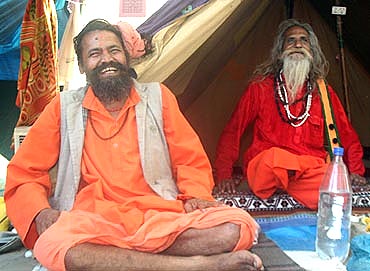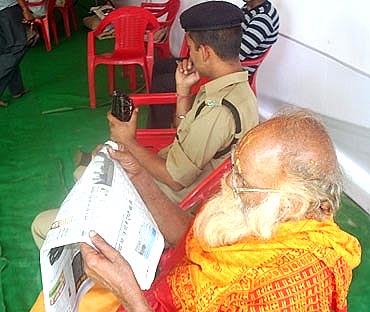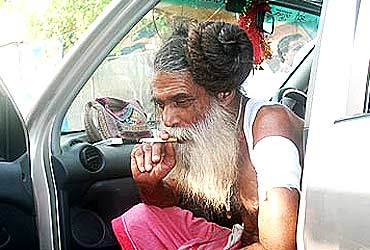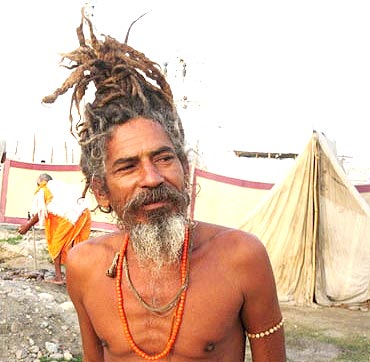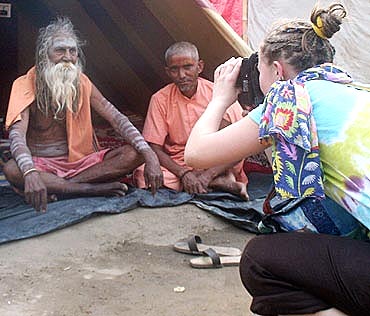 | « Back to article | Print this article |
Sadhus have a blast at the Kumbh Mela
Rediff.com's Sheela Bhatt, Sanchari Bhattacharya and Reuben N V travel to Haridwar to be a part of the world's largest religious gathering.
Thousands of sadhus and sants from across India have congregated in Haridwar to attend the Purna Kumbh Mela.
Many of them participated in the Chaitra Purnima Snan (religious bath) at Har ki Pauri, the main ghaat in Haridwar.
Sadhus have a blast at the Kumbh Mela
The Chaitra Purnima Snan is one of the several religious baths which are considered the main events of Kumbh Mela.
It is also known as Akhara Snan -- the day when thousands of sadhus from the six Vaishnav akharas take a ritual dip in Ganga Ma.
Sadhus have a blast at the Kumbh Mela
The Naga sadhus are one of the major attractions of the Kumbh Mela. These sadhus give up everything, including their clothes, during their indoctrination into sanyaas.
Though they are considered to be short-tempered and aggressive, most Naga sadhus simply prefer to be left alone. They quietly inhabit a remote camp at the Mela and are reluctant to talk to the media or the tourists.
Sadhus have a blast at the Kumbh Mela
They are known to be avid worshippers of Agni (fire god) and smear themselves with vibhuti (ash). The vibhuti is believed to not only be holy but also hold special protective and curative powers.
Many devotees at the Mela seek out these reclusive Naga sadhus to obtain their special vibhuti.
Sadhus have a blast at the Kumbh Mela
These sadhus are known for their penchant for their ganja (cannabis) chillams. With a deafening cry of Alak Niranjan (A term denoting God; literally means the one who is sightless and spot-free), they light up their chillams and take a drag.
But they insist that the mild narcotic, taken in limited quantities, helps them concentrate better during meditation and yoga.
Sadhus have a blast at the Kumbh Mela
The Maha Kumbh Mela held in Prayag every 12 years is considered to be the world's largest religious gathering. The Maha Kumbh held in 2001 attracted over 1.5 crore people.
But the Purna Kumbh Mela in Haridwar witnesses the maximum gathering of saints and holy men; most of them come from ashrams in nearby religious sites like Hrishikesh, Uttarkashi, Ujjwain, Onkareshwar, Badrinath and Kedarnath.
Sadhus have a blast at the Kumbh Mela
Most of them put up make-shift ashrams at the venue of the Mela, which goes on for four months, along with their devoted followers and disciples.
While some of these ashrams are huge and ostentatious, others are humble and parsimonious, and the steady flow of the faithful is the common thread that binds them.
Sadhus have a blast at the Kumbh Mela
The ritual bath in the Ganga, during the Kumbh Mela, is believed to wash away one's accumulated sins and put an end to the endless cycle of life and birth
Haridwar is believed to be the place where the Ganga leaves her Himayalan abode and flows into the plains.
Sadhus have a blast at the Kumbh Mela
Kumbh Mela is also famous for the flamboyance and unique style sported by the various sadhus, right from the unruly dreadlocks to the bright attires.
Saffron, red, yellow and white are the most common hues worn by these saint. The varying shades are indicative of the progress made in one's spiritual journey, whether he/she is practising Brahmacharya, Vaanprastha or Sanyaas.

